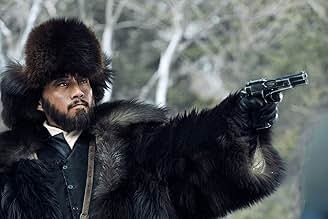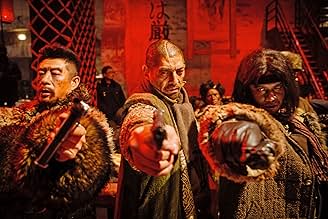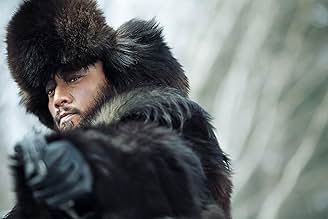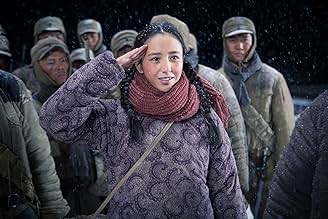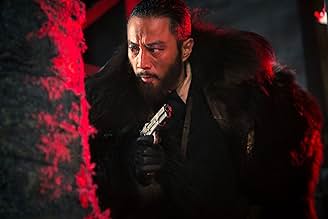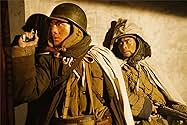IMDb RATING
6.4/10
3.4K
YOUR RATING
A story focusing on a conflict between a People's Liberation Army squad and a bandit gang in north-east China during the Chinese revolution.A story focusing on a conflict between a People's Liberation Army squad and a bandit gang in north-east China during the Chinese revolution.A story focusing on a conflict between a People's Liberation Army squad and a bandit gang in north-east China during the Chinese revolution.
- Awards
- 21 wins & 41 nominations
Sooeung 'Chuck' Chae
- Ray
- (as Chuck Chae)
Sihan Cheng
- Bro 4
- (as Shihan Cheng)
Storyline
Did you know
- TriviaThe Tiger is a Siberian Tiger. The largest of the cats.
- ConnectionsRemake of Tracks in the Snowy Forest (1960)
Featured review
Every December, in the China mainland, is the protective month for Chinese productions in local multiplexes, practically all the foreign tent-poles are pushed back and it is also the most profitable period for this vastly booming market. This year, the two main contenders are GONE WITH THE BULLETS (2014), Wen Jiang's much-hyped follow-up to the massively successful LET THE BULLETS FLY (2010, 8/10) and this Hark Tsui's latest offer of a 3D spectacle retelling a legendary battle during the period of Chinese Civil war. Nevertheless the former receives some unexpected backlash from critics and audience, which prompts me to pick the latter, plus I am bringing my parents, who will feel more related to the story since they know the original tale very well.
Much exceeding my expectation, this is by far the most amazing 3D Chinese film I have ever watched in the theater, breathtakingly sets out the vast North East snowfield where the story unfolds, without compromising the luminance of the screen. Despite that the film starts with a modern-day prologue in New York, which inconveniently enforces a weird sense of incongruity with the main event, the first impression is pretty awesome, however, this subplot will continue to distract viewers out of the picture every so often and largely banks on heart-throb Gen Han's presence.
The story takes place in 1947, a Communist detachment named 203 lead by Jianbo (Kenny Lin) fights against the bandit chieftain Cinereous Vulture (Leung), who takes over the Tiger Mountain with his eight warriors and thousands of bandits, plus heavy arms left by Japanese after the Anti-Japanese War (1937-1945), including artilleries, cannons and a tank. Hogging the vantage point, they constantly attacks the villages nearby and becomes a major threat in the turf. Whereas the detachment has only 30 soldiers altogether with much lighter weaponry. There is only one way to win this battle against heavy odds, to circumvent the head-on confrontation and outwit the enemy by an audacious sneak attack.
So Zirong Yang (Hanyu Zhang), a singular soldier, proposes an undercover scheme, he volunteers to infiltrate into the gang and look for a weak link in their defense system, so they can capture them all at one swoop. The mission is an adventurous one full of pitfalls and any small slip will cost Yang's life, Hanyu Zhang embodies this lone hero bravura with enthralling excitement and poise, confidently delivers bandit's cant and liberates his masculine charisma as a military man. Hong Kong veteran Tony Ka Fai Leung, almost unrecognizable here as the villain, easily stands out with his flashy and distinctive outfits, so is his eight warriors, all have been upgraded with eye-popping apparel and apparatuses. By contrast, the Communist soldiers are far more plain and conventional. Kenny Lin outstrips his youthful greenness, strenuously leaves an impression of being mature and serious. With six screenwriters credited, they enrich the film with adequate suspense, sporadic humor, the routine sacrifice and female presence (e.g. Nan Yu owns her dramatic outburst in a crudely sketched characterization).
Hark Tsui has ventured into 3D technology since two DETECTIVE DEE films and the dismaying FLYING SWORDS OF DRAGON GATE (2011, 3/10), so finally he reaches the benchmark with this one, along with the dashing bullets and grenades slo-motion, he also schemes a prolonged alternative ending after the credits, just to show that now the industrial special effects craftsmanship is no interior compared with the Hollywood criterion. One can grudge about the final coup de main is way too easy to accomplish, but for anyone who is familiar with the current status of Chinese cinema, it is a good relief we can dish up such an entertaining blockbuster independently, and its box-office prospect is quite promising too, a sure-fire to reach a career-high for the maestro Hark after 35 years in the line.
Much exceeding my expectation, this is by far the most amazing 3D Chinese film I have ever watched in the theater, breathtakingly sets out the vast North East snowfield where the story unfolds, without compromising the luminance of the screen. Despite that the film starts with a modern-day prologue in New York, which inconveniently enforces a weird sense of incongruity with the main event, the first impression is pretty awesome, however, this subplot will continue to distract viewers out of the picture every so often and largely banks on heart-throb Gen Han's presence.
The story takes place in 1947, a Communist detachment named 203 lead by Jianbo (Kenny Lin) fights against the bandit chieftain Cinereous Vulture (Leung), who takes over the Tiger Mountain with his eight warriors and thousands of bandits, plus heavy arms left by Japanese after the Anti-Japanese War (1937-1945), including artilleries, cannons and a tank. Hogging the vantage point, they constantly attacks the villages nearby and becomes a major threat in the turf. Whereas the detachment has only 30 soldiers altogether with much lighter weaponry. There is only one way to win this battle against heavy odds, to circumvent the head-on confrontation and outwit the enemy by an audacious sneak attack.
So Zirong Yang (Hanyu Zhang), a singular soldier, proposes an undercover scheme, he volunteers to infiltrate into the gang and look for a weak link in their defense system, so they can capture them all at one swoop. The mission is an adventurous one full of pitfalls and any small slip will cost Yang's life, Hanyu Zhang embodies this lone hero bravura with enthralling excitement and poise, confidently delivers bandit's cant and liberates his masculine charisma as a military man. Hong Kong veteran Tony Ka Fai Leung, almost unrecognizable here as the villain, easily stands out with his flashy and distinctive outfits, so is his eight warriors, all have been upgraded with eye-popping apparel and apparatuses. By contrast, the Communist soldiers are far more plain and conventional. Kenny Lin outstrips his youthful greenness, strenuously leaves an impression of being mature and serious. With six screenwriters credited, they enrich the film with adequate suspense, sporadic humor, the routine sacrifice and female presence (e.g. Nan Yu owns her dramatic outburst in a crudely sketched characterization).
Hark Tsui has ventured into 3D technology since two DETECTIVE DEE films and the dismaying FLYING SWORDS OF DRAGON GATE (2011, 3/10), so finally he reaches the benchmark with this one, along with the dashing bullets and grenades slo-motion, he also schemes a prolonged alternative ending after the credits, just to show that now the industrial special effects craftsmanship is no interior compared with the Hollywood criterion. One can grudge about the final coup de main is way too easy to accomplish, but for anyone who is familiar with the current status of Chinese cinema, it is a good relief we can dish up such an entertaining blockbuster independently, and its box-office prospect is quite promising too, a sure-fire to reach a career-high for the maestro Hark after 35 years in the line.
- lasttimeisaw
- Dec 27, 2014
- Permalink
- How long is The Taking of Tiger Mountain?Powered by Alexa
Details
Box office
- Gross US & Canada
- $228,984
- Opening weekend US & Canada
- $50,621
- Jan 4, 2015
- Gross worldwide
- $141,654,055
- Runtime2 hours 21 minutes
- Color
- Sound mix
- Aspect ratio
- 1.85 : 1
Contribute to this page
Suggest an edit or add missing content

Top Gap
By what name was The Taking of Tiger Mountain (2014) officially released in Canada in English?
Answer


